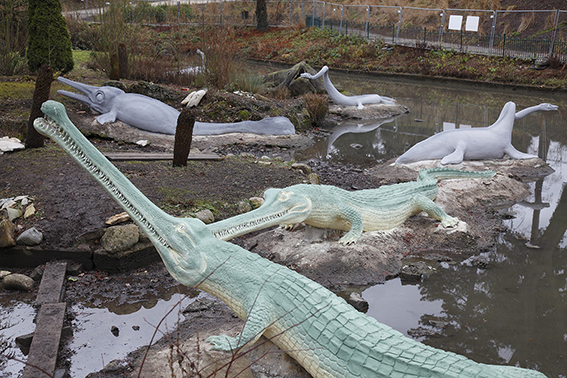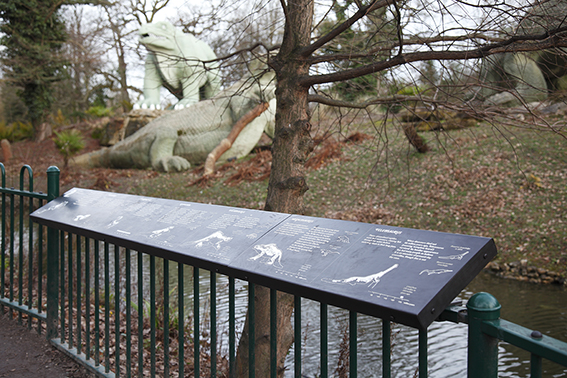Until I first ventured on to Dino island, I had no knowledge of the mosasaur's existence. Hidden away on the far side by the weir, he is partially submerged, and up until the latest round of conservation, was barely visible through the abundant undergrowth. He has now emerged, looking splendid in his eye-catching green scales, next to the brand new weir.
This latest phase of work, was not just about conservation, but also involved some major engineering. The lake had to be drained, as the focus of the conservation was on the semi-submerged creatures, and a temporary barrage and bridge were installed, so that the new weir could be constructed. Undertaken by Skillingtons Workshop Ltd., who had successfully worked on the 6 sphinxes, progress during the winter months was slow, with all work having to stop during periods of heavy frost. You may have spotted some of the sculptures wrapped in bright blue tarpaulin for their protection. Now that the wraps are off, the impressive work of the conservation team, headed by Mark Porter, contrasts starkly with the remaining unrestored beasts, but will hopefully spur on the fundraising for the additional £800,000 required to complete the restoration programme.
I made several trips over to the island to document the works, starting last october.
 |
| Dino dentistry |
 |
| Pedro Jimenez working on a Teleosaurus |
 |
| Elizabeth Esteban Teruelo working on the Ichthyosaurus |
 |
| Mark Porter attending to a Plesiosaurus |
 |
| Weeds sprouting from one of the sculptures |
 |
| Mark pointing out the rusting inner framework |
 |
| The fibre glass head of the Plesiosaurus would have been added during the last restoration programme, 15 years or so ago |
 |
 |
| Catarina Ramalho |
December 2016
 |
| Mosasaurus with new nose and colourful coat |
 |
| The barrage |
 |
| Temporary bridge to the island |
 |
| The new weir |
February 2017
And finally, my most recent visit to the park, was to see the newly installed signs and information boards.














































































